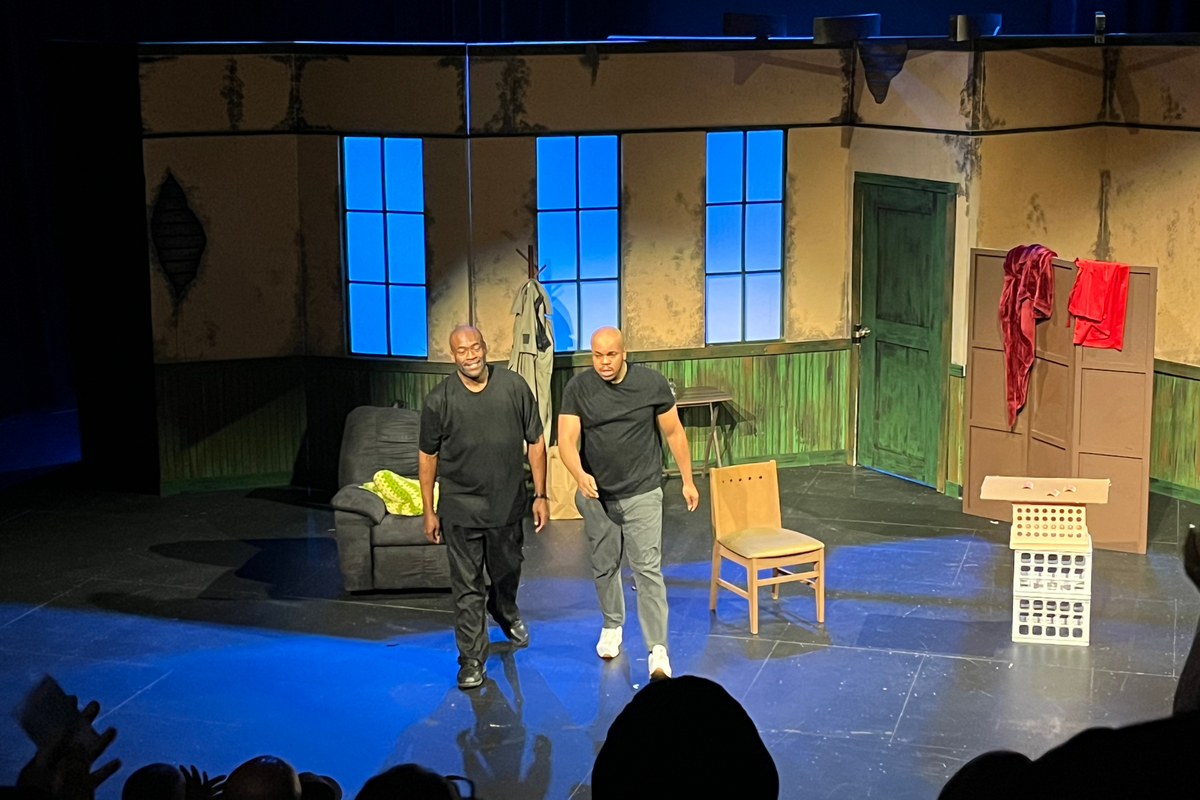Tulsa
Theatre North Has A Win With “Topdog”
by | Feb 29, 2024 12:55 pm
Post a Comment | E-mail the Author
Posted to: Theater

ALICIA CHESSER PHOTO
Obum Ukabam and Ibrahim Buyckes after "Topdog/Underdog"
Theatre North
“Topdog/Underdog“
Tulsa Performing Arts Center
Feb. 25, 2024
There’s no winning in the game explored in Topdog/Underdog, Suzan-Lori Parks’ 2002 Pulitzer Prize-winning play, which Theatre North recently presented in an excellent production directed by Robert S. Walters. That forward slash in the title tells it all: every reality has two faces, and guessing which one’s going to end up on top is as thrilling and futile as trying to follow the hands of three-card monte that scatter throughout this play.
Who’s playing whom here? “Watch me close, watch me close now,” says Ibrahim Buyckes in the opening moments, addressing the audience as much as the imagined tourists he’s practicing to hustle. Buyckes plays Booth, a young Black man whose charm and bluster are always just a card-flip away from rage. He’s trying to get good at a game his older brother, Lincoln, once excelled at but walked away from in favor of “a sit-down job with benefits”: playing the historical Abraham Lincoln at a local sideshow arcade, where patrons get a gun when they pay their fare so they can play at shooting him, just like John Wilkes Booth.
As Booth works out his rhythm in that opening scene, Linc (Obum Ukabam) slips into his brother’s one-room apartment in his ratty presidential work getup, wearing whiteface and a top hat and carrying a bag of Chinese takeout. That entrance is one of Topdog/Underdog’s many visual and narrative gambits. No matter how closely we keep our eye on the cards, we’re always pulled up short by what actually happens.
For these brothers — and, the play suggests, for many living in American capitalism, Black men in particular — every win is embedded with loss. Openings are dead ends; promises reach you with a stinger inside; the cycle isn’t boom and bust but boon and betrayal, an infinite game where the real stakes are human lives. The historical trauma of America, going way on back beyond the present-day Lincoln and Booth and their namesakes (their father gave them those names, Linc says, “as a joke”), means there’s very little ground to build on for these men, whose parents abandoned them in their youth, leaving each a $500 “inheritance” (or as Booth calls it at the play’s teeth-clenching finish, “my payoff” after catching mom with her “Thursday Man”). There’s little solid ground for the audience, either. Again and again, the play plants glimpses of fact and then pulls them away so all we see is the ricochet in their wake.
A rigged game there’s no getting away from, even when nobody wants to play: in Parks’ hands, that situation is equal parts tragedy and hilarity, and we never know when one is about to turn into the other. Walters and his actors kept the patter and the emotional flips moving deftly; I felt the water boiling in the pot but barely realized I was being cooked until, over and over, there was no way to escape. Even the production’s one big lull had a mighty payoff. After a long pause between scenes one and two, Buyckes came back onstage wearing two complete suits one on top of the other (both on top of his regular clothes). In a silent comedy passage straight out of a Buster Keaton film, he pulled a series of ties, shirts, pairs of shoes, and a magazine out of his pockets and pants — then hauled in a room divider (also boosted) from the hall. “I stole, and I stole generously,” he proudly tells Linc, in one of the play’s many blisteringly funny lines.
Buyckes and Ukabam wrapped their whole selves around the challenges of this play — the former upselling Booth’s virility even as his rapid-fire laugh (and his collection of what Linc calls “fuck books” under the bed) proclaims his little boy-ness, the latter letting Linc shift before our eyes, his sweet-voiced looseness laced with love, grief, and vinegar. Mos Def and Jeffrey Wright have played these roles on Broadway. These actors were up to the task, particularly Ukabam, whose masterfully paced delivery brought every dialogue and monologue to the keenest possible edge.

ALICIA CHESSER PHOTO
Theatre North's Artistic Director Maybelle Wallace in pre-show remarks
A play with this much firepower doesn’t need much in the way of trimming, and this production kept it simple, with a set by Rich Goss that looked like a desiccated artifact of history that these men are living in here and now, calling “home.” I could have wished for more dynamic lighting to parallel the almost symphonic orchestrations of time and focus in Parks’ script, but that’s a “want not need” given the excellence of the show as a whole.
Topdog/Underdog leaves us not with a win but a wail: Booth’s, as he holds the older brother he’s just shot in his arms, moments after Linc bested him in a “real” game of three-card monte with his dollars and Booth’s inheritance on the table. The sleights of hand the play slips into its last ten minutes bring the whole house down. Who does have a win on their hands, though, is Tulsa’s oldest Black theatre company. The riotous applause that met this play’s ending at both showings I attended proclaimed one reality that’s never in doubt: Theatre North brings the heat, the light, and all the right questions.
Next from Alicia: Oklahoma Fashion Alliance, “Is The Earth Just A Body, Too?”